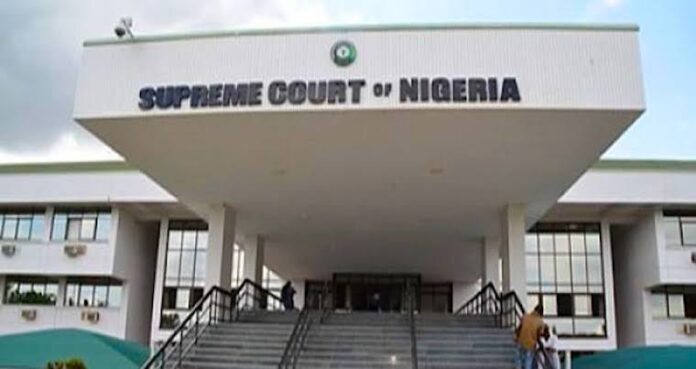Stories by ANTHONY OCHELA, ABUJA
Lawyer for a company, Owigs and Obigs Nigeria Ltd has dragged the Supreme Court before the National Assembly, alleging that it issued a judgment that is fraudulent and makes mockery of the legislative efforts of the Assembly.
The allegations were contained in an open letter addressed to the chairman, Senate Committee on Judiciary and copied the Office of the President of Senate titled: “Can of worms in the Supreme Court and redefining what constitutes a final judgment:- Request for urgent intervention and demand for swift action in judgment of appeal no: SC/CV/709/2020.”
The petition dated January 21, accused the Supreme Court of brazen disregard for the tenets and principles of the law in a recent judgment involving international commercial contract dispute in appeal no SC/CV/709/2020 between Owigs and Obigs Nig Ltd vs Zenith Bank Plc.
The lawyer, Emeka Okorie, described the judgment as “a glaring example of how Nigerian laws have been brazenly disregarded and urinated upon by the misguided majority judges of the panel, resulting in a fraudulent judgment that defies logic and justice.”
Okorie alleged that in the course of hearings, the respondent bank acknowledged in writing and during cross-examination that it breached the international commercial contract in issue.
He noted that “evidence on record and the Court of Appeal’s findings corroborated this breach. Even the dissenting Supreme Court judge agreed based on evidence of the bank’s admission and the record.
“However, the Supreme Court judges disregarded these facts and fabricated a fictitious international commercial contract. They wrongly absolved the defaulting bank of liability and dismissed the existence of the original contract, despite evidence and admissions to the contrary.
“This erroneous judgment was imposed on the parties in favour of the respondent bank, damaging Nigeria’s reputation before the international business community.”
Highlighting what he described as the flaws in the judgment, Okorie, among other issues, alleged that contrary to all evidence on record, the court rewrote the international contract reversing contractual roles of parties and transferring the default liabilities from the defaulting party to the innocent party, contrary to the uniform customs and practice regulating international commercial contract financed by letter of credit.
He also alleged that the court fabricated an alternative letter of credit relying on non-existent contract, contrary to evidence and dissenting judges opinion.
According to him, the court twisted autonomous contract dispute between the confirming bank and seller, confirming the bank’s breach as buyer-seller dispute and undermining contract autonomy to shield the defaulting bank from liability.
He accused the Supreme Court of replacing the Appeal Court’s ruling and appellants pleading with fictitious substitutes untraceable in court records.
In another instance, he alleged that the Supreme Court injected spurious arguments unconnected to the dispute, questioning the period of profitability calculations and contract validity.
He alleged that “The court illegally excluded the confirming bank, the defaulting party from the contract to prevent them from being held accountable.”
These actions, he said “displayed judicial dishonesty and their ruling showcase a blatant disregard for the law, the contract and the truth, therefore exploiting their position to perpetuate injustice, oppress, intimidate and humiliate the innocent party on its fundamental rights rather than uphold the law and the contract.”
The lawyer maintained that “these actions are a stark example of judicial corruption, the nondefaulting party deserves justice, and the defaulting party must be held accountable for their breach, as honest litigants are discouraged from seeking justice, knowing that the system is rigged against them.”
Okorie described the judgment as a malicious robbery that must be reversed to restore trust in the Supreme Court and uphold the rule of law.
Giving reasons why the Supreme Court must reverse itself on this particular judgment, the lawyer said “by legalising illegality, the judgment sends a wrong signal that the nation and its banks are unsafe for business.
“This raises a red flag for investors, tarnishes the nation’s reputation and sabotages government’s efforts to rebuild the economy.”
He insisted that the judgment is “a case study of the Supreme Court which is now a burial ground for justice in this matter, where misguided judges rendered a perverse decision.
“The injustice was so blatant that, for the first time, the affected party had to confront the Supreme Court with evidence of fraud in the judgment. This was done through a distress letter of appeal dated December 10, 2024, which demanded the reversal of the fraudulent judgment.”
The lawyer urged the National Assembly to “take immediate action to address this issue, and I request a swift and thorough inquiry into this matter to save the image of our nation before the international trading community.”
He said the National Assembly, should as a matter of urgency, “clearly redefine what constitutes a final judgment in the Supreme Court. The Supreme Court cannot turn itself into the Kingdom Supreme Headquarters of Injustice in this particular matter.”





